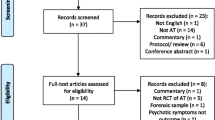Abstract
Problems with adherence to medication are common in patients with schizophrenia. This article reviews the principles that have been developed by the STAY (the Six principles to improve Treatment Adherence in Your patients) initiative to help patients with schizophrenia adhere to their medication.

Similar content being viewed by others
References
Cañas F, Alptekin K, Azorin JM, et al. Improving treatment adherence in your patients with schizophrenia: the STAY initiative. Clin Drug Invest. 2013;33(2):97–107.
Velligan DI, Weiden PJ, Sajatovic M, et al. The expert consensus guideline series: adherence problems in patients with serious and persistent mental illness. J Clin Psychiatry. 2009;70(Suppl 4):1–46.
Lacro JP, Dunn LB, Dolder CR, et al. Prevalence of and risk factors for medication nonadherence in patients with schizophrenia: a comprehensive review of recent literature. J Clin Psychiatry. 2002;63(10):892–909.
Ascher-Svanum H, Faries BE, Zhu B, et al. Medication adherence and long-term functional outcomes in the treatment of schizophrenia in usual care. J Clin Psychiatry. 2006;67(3):453–60.
Weiden PJ, Zygmut A. Medication noncompliance in schizophrenia. Part I: assessment. J Pract Psychiatry Behav Health. 1997;3:106–10.
Perkins DO, Hongbin G, Weiden PJ, et al. Predictors of treatment discontinuation and medication nonadherence in patients recovering from a first episode of schizophrenia, schizophreniform disorder, or schizoaffective disorder: a randomized, double-blind, flexible-dose, multicenter study. J Clin Psychiatry. 2008;69(1):106–13.
Nosé M, Barbui C, Tansella M. How often do patients with psychosis fail to adhere to treatment programmes? A systematic review. Psychol Med. 2003;33(7):1149–60.
Llorca PM. Partial compliance in schizophrenia and the impact on patient outcomes. Psychiatry Res. 2008;161(2):235–47.
Lieberman JA, Stroup TS, McEvoy JP, et al. Effectiveness of antipsychotic drugs in patients with chronic schizophrenia. N Engl J Med. 2005;353(12):1209–23.
Novick D, Haro JM, Suarez D, et al. Predictors and clinical consequences of non-adherence with antipsychotic medication in the outpatient treatment of schizophrenia. Psychiatry Res. 2010;176(2–3):109–13.
Morisky DE, Green LW, Levine DM. Concurrent and predictive validity of a self-reported measure of medication adherence. Med Care. 1986;24(1):67–74.
Thompson K, Kulkarni J, Sergejew AA. Reliability and validity of a new Medication Adherence Rating Scale (MARS) for the psychoses. Schizophr Res. 2000;42(3):241–7.
Dolder CR, Lacro JP, Warren KA, et al. Brief evaluation of medication influences and beliefs: development and testing of a brief scale for medication adherence. J Clin Psychopharmacol. 2004;24(4):404–9.
Byerly MJ, Nakonezny PA, Rush AJ. The Brief Adherence Rating Scale (BARS) validated against electronic monitoring in assessing the antipsychotic medication adherence of outpatients with schizophrenia and schizoaffective disorder. Schizophr Res. 2008;100(1–3):60–9.
Clayton CD, Veach J, Macfadden W, et al. Assessment of clinician awareness of nonadherence using a new structured rating scale. J Psychiatr Pract. 2010;16(3):164–9.
Kemp R, Hayward P, Applewhaite G, et al. Compliance therapy in psychotic patients: randomised controlled trial. BMJ. 1996;312(7027):345–9.
Baumann P, Hiemke C, Ulrich S, et al. The AGNP-TDM expert group consensus guidelines: therapeutic drug monitoring in psychiatry. Pharmacopsychiatry. 2004;37(6):243–65.
Frank AF, Gunderson JG. The role of the therapeutic alliance in the treatment of schizophrenia: relationship to course and outcome. Arch Gen Psychiatry. 1990;47(3):228–36.
Fleischhacker WW, Hofer A, Hummer M. Managing schizophrenia: the compliance challenge. 2nd ed. London: Science Press; 2007.
Kane JM. Review of treatments that can ameliorate nonadherence in patients with schizophrenia. J Clin Psychiatry. 2006;67(Suppl 5):9–14.
Smerud PE, Rosenfarb IS. The therapeutic alliance and family psychoeducation in the treatment of schizophrenia: an exploratory prospective change process study. J Consult Clin Psychol. 2008;76(3):505–10.
Pitschel-Walz G, Leucht S, Bäuml J, et al. The effect of family interventions on relapse and rehospitalization in schizophrenia: a meta-analysis. Schizophr Bull. 2001;27(1):73–92.
Dolder CR, Lacro JP, Leckband S, et al. Interventions to improve antipsychotic medication adherence: review of recent literature. J Clin Psychopharmacol. 2003;23(4):389–99.
Author information
Authors and Affiliations
Consortia
Rights and permissions
About this article
Cite this article
Adis Medical Writers. Following the six principles developed by the STAY initiative may improve treatment adherence in patients with schizophrenia. Drugs Ther Perspect 29, 287–290 (2013). https://doi.org/10.1007/s40267-013-0066-4
Published:
Issue Date:
DOI: https://doi.org/10.1007/s40267-013-0066-4




